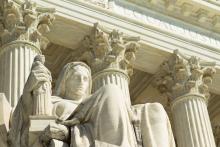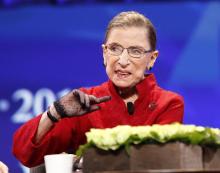Justice Ruth Bader Ginsburg

The Supreme Court ruled unanimously to uphold the traditional interpretation of “one person, one vote,” in which all residents — not just eligible voters — count toward population totals for electoral districts, reports Talking Points Memo. The opinion in the case, Evenwel v. Abbott, was authored by Justice Ruth Bader Ginsburg. Justices Samuel Alito and Clarence Thomas wrote concurring opinions.

Rabbi Ruth Bader Ginsburg?
Not quite, but when a Jewish nonprofit asked the Supreme Court justice to write a biblical commentary for Passover, she agreed, and added a feminist twist: It would raise up the often overlooked women of the Exodus story.
Ginsburg, one of three Jews and three women on the high court, is known as a champion of women’s rights — but not for being particularly religious.
But Rabbi Lauren Holtzblatt, whom Ginsburg asked to help out with the commentary, said Ginsburg had a clear vision for the piece and knew exactly which biblical women she wanted to highlight from the iconic liberation story of the Book of Exodus.
“She has a Jewish soul, there is no question,” Holtzblatt, a rabbi at Adas Israel, a Conservative synagogue in Washington, D.C., said of Ginsburg.
“It’s in her. It’s deeply in her.”

The Supreme Court offered a further sign that it favors letting employers with religious objections avoid the Obama administration’s so-called contraception mandate.
Over the vehement objection of its three female justices, the court late Thursday blocked the administration from forcing evangelical Wheaton College to sanction insurance coverage for emergency birth control, even though it would not have had to offer the coverage itself.
In doing so, the court made clear that it’s not done with the religious liberty issue following the court’s June 30 ruling that closely-held, for-profit corporations with objections to certain contraception methods do not have to offer this type of coverage to their employees.